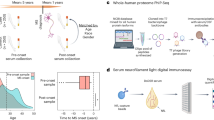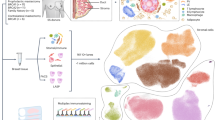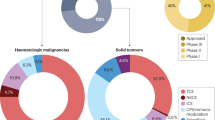Abstract
Tumorigenesis of meningioma has been associated with chromosome 22, most notably the NF2 gene, but additional genes have also been implicated in meningioma development. Previously, we have cloned the cDNAs for the meningioma expressed antigen 6 (MGEA6) and its splice variant MGEA11. Here, we show that antibodies against recombinantly expressed MGEA6/11 are found in 41.7% (10/24) of the sera from meningioma patients and in 2/8 sera of glioblastoma patients, whereas no response was seen in 12 sera from healthy persons. Western-blot analyses using generated polyclonal antibodies, revealed overexpression in meningioma and glioma tumor samples compared to normal brain. Immunohistochemical staining of tissue sections confirms reactivity in meningioma tumor cells and tumor cells of glial origin. We found no reactivity to normal astrocytes and only faint reactivity to normal leptomeninges. Sequence analysis predicted membranic localization of MGEA6/11, that was confirmed by cell fractionation. The immune response to MGEA6/11 is frequent in both meningioma and glioma patients and may likely be attributed to overexpression of the MGEA6/11 protein in the tumor cells.
This is a preview of subscription content, access via your institution
Access options
Subscribe to this journal
Receive 50 print issues and online access
$259.00 per year
only $5.18 per issue
Buy this article
- Purchase on Springer Link
- Instant access to full article PDF
Prices may be subject to local taxes which are calculated during checkout





Similar content being viewed by others
References
Akagi K, Kurahashi H, Arita N, Hayakawa T, Monden M, Mori T, Takai S, Nishisho I . 1995 Int. J. Cancer 60: 178–182
Barker CF, Billingham RE . 1977 Adv. Immunol. 25: 1–54
Becker I, Roggendorf W . 1989 J. Neuroimmunol. 25: 161–167
Ben-Mahrez K, Sorokine I, Thierry D, Kawasumi T, Ishi S, Salmon R, Kohiyama M . 1990 Int. J. Cancer 46: 35–38
Boon T, Lloyd JO . 1997 Curr. Opin. Immunol. 9: 681–683
Comtesse N, Heckel D, Racz A, Brass N, Glass B, Meese E . 1999 Clin. Cancer Res. 5: 3560–3568
Comtesse N, Reus K, Meese E . 2001 Genomics 75: 43–48
Disis ML, Cheever MA . 1996 Curr. Opin. Immunol. 8: 637–642
Disis ML, Calenoff E, McLaughlin G, Murphy AE, Cehn W, Groner B, Jeschke B, Lydon N, McGlynn E, Livingston RB, Moe R, Cheever MA . 1994 Cancer Res. 54: 16–20
Gallagher G, Al-Azzawi F, Walsh LP, Wilson G, Handley J . 1991 Br. J. Cancer 61: 35–40
Harlow E, Lane D . 1988 Antibodies A Laboratory Manual Cold Spring Harbor Laboratory: USA
Heckel D, Brass N, Fischer U, Blin N, Steudel I, Türeci Ö, Fackler O, Zang KD, Meese E . 1997 Hum. Mol. Genet. 6: 2031–2041
Heckel D, Comtesse N, Brass N, Blin N, Zang D, Meese E . 1998 Hum. Mol. Genet. 7: 1859–1872
Kleihues P, Cavenee WK . 2000 Pathology & Genetics. Tumours of the Nervous System IARC Press: France
Marcias MJ, Hyvonen M, Baraldi E, Schultz J, Sudol M, Saraste M, Oschkinat H . 1996 Nature 382: 646–649
Merrifield RB . 1963 J. Am. Chem. Soc. 85: 2149–2158
Pees HW, Seidel B . 1976 Clin. Exp. Immunol. 24: 310–316
Pees HW . 1979 Acta. Neurochir. (Wien) 50: 217–227
Pupa SM, Menard S, Andreola S, Colnaghi MI . 1996 Cancer Res. 53: 5864–
Real FX, Furukaw KS, Mattes MJ, Gusik SA, Cordon-Cardo C, Oettgen HF, Old LJ, Lloyd KO . 1988 Proc. Natl. Acad. Sci. USA 85: 3965–3969
Ruttledge MH, Sarrazin J, Rangaratnam S, Phelan CM, Twist E, Merel P, Delattre O, Thomas G, Nordenskjold M, Collins VP, Dumanski JP, Rouleau GA . 1994 Nature Genet. 6: 180–184
Tabuchi K, Kawakami Y, Nishimoto A . 1979 Acta. Neurochi. (Wien) 55: 201–211
Yamamoto A, Shimiziu E, Ogura T, Sone S . 1996 Int. J. Cancer 69: 283–289
Acknowledgements
The authors thank Prof Dr WI Steudel and the staff of the Neurosurgical Clinic for providing fresh tumor samples. We thank Mr Marc Voss, Department of Virology, for the excellent help preparing the cell fractions. The skilled technical assistance of Mr W Förderer, Mr P Krück, Mrs S Leyes, Mrs B Simon and Mr B Stock, Department of Neuropathology, is greatly appreciated. This work was supported by a grant from the Deutsche Forschungsgemeinschaft (SFB 399, A4).
Author information
Authors and Affiliations
Corresponding author
Rights and permissions
About this article
Cite this article
Comtesse, N., Niedermayer, I., Glass, B. et al. MGEA6 is tumor-specific overexpressed and frequently recognized by patient-serum antibodies. Oncogene 21, 239–247 (2002). https://doi.org/10.1038/sj.onc.1205005
Received:
Revised:
Accepted:
Published:
Issue Date:
DOI: https://doi.org/10.1038/sj.onc.1205005
Keywords
This article is cited by
-
Mea6 controls VLDL transport through the coordinated regulation of COPII assembly
Cell Research (2016)
-
Mechanisms for exporting large-sized cargoes from the endoplasmic reticulum
Cellular and Molecular Life Sciences (2015)
-
Analysis of the CTAGE5 P521A Variation with the Risk of Familial Idiopathic Basal Ganglia Calcification in an Iranian Population
Journal of Molecular Neuroscience (2013)
-
Population and Computational Analysis of the MGEA6 P521A Variation as a Risk Factor for Familial Idiopathic Basal Ganglia Calcification (Fahr’s Disease)
Journal of Molecular Neuroscience (2011)
-
Combining gene expression signatures and autoantibody profiles in human meningioma
Gene Therapy (2009)



